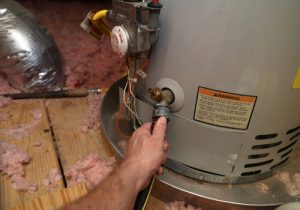Water heaters have different lifespans depending on the type of heater you have, the frequency of its use, and the way you maintain it. As a general rule, you should replace your water heater every six to 12 years if it is a tank-based water heater. If you use a tankless water heater, it is not unheard of for the water heater to last as long as 20 years. It’s good practice to get your water heater looked at regularly by a skilled plumbing technician, and it’s also good to budget for a new water heater about once every decade. Even if you don’t have to buy one quite yet, it’s good to have the money on hand if an emergency occurs.
At Plumbing by Jake, we have all the tools and experience necessary to install, repair, maintain, and replace your water heater when it’s time. Call our office at (928) 377-5910 to schedule an appointment about your water heater needs. If it’s an emergency, we’re available around the clock, so you never have to go without a plumbing solution to your woes.
Steps to Take to Lengthen Your Water Heater’s Lifespan
Replacing any appliance can be a hassle. But when that appliance is as large and important as a water heater and has a large daily impact on your life, that hassle becomes more severe. Fortunately, you shouldn’t have to worry about replacing your water heater more than once every dozen years or so. Below, we’ve listed some steps you can take to extend the life of your water heater (tankless or otherwise) and put off having to replace it.
Control Your Sediment
The quality of your water has a lot to do with your water heater’s longevity. Contaminants build up over time, causing rust, plumbing blockages, and a breakdown of machinery. Typical sediments and contaminants found in the average homeowner’s water include:
- Metal ions
- Chlorine
- Arsenic
- Fluoride
- Microorganisms
You may be able to taste the presence of contaminants in so-called “hard” water. In other situations, they may go undetected. Some of the above contaminants are dangerous to your health, such as arsenic, while others are added to municipal water supplies for health or sanitation reasons (such as fluoride).
Metallic contaminants are especially harmful to your water heater and other plumbing elements. They build up and cause damage to the internal consistency of your pipes. By controlling these issues, you can extend the life of not just your water heater, but your entire plumbing system.
Invest in Maintenance
As with most appliances, the main way to extend the life of your water heater is to maintain it regularly, rather than waiting for something to go wrong and then fixing it. While repairs are possible, it is almost always more cost-effective to prevent problems than to deal with them after they arise. Nobody wants to be surprised by a cold shower first thing in the morning!
Yet, who has time in their busy schedule to learn how to check for (and fix) potential water heater hazards? Not to worry. At Plumbing by Jake, you can schedule an annual home plumbing maintenance plan to ensure that our technicians keep your water heater (and other plumbing fixtures) operating smoothly. When you have regular maintenance on your water heater, you prevent small problems from becoming big enough to threaten the life of the appliance.
How to Know You Need a New Water Heater
There are a variety of signs that you might need to replace your water heater. Of course, a total breakdown of the heater is the obvious one. However, keep your eye out for the following issues that might be harbingers of your water heater’s demise. Keep in mind that the Plumbing by Jake technicians will check for these problems during your regular maintenance appointments as well.
Rust in Your Water
If you see rust when you turn on your water, this can be a sign that the interior of your water heater has rusted out. However, there are other problems that can result in rusty water, such as general disrepair in your pipes.
Water Seepage
If your water heater constantly has water around it, chances are good that you may have a leak. Sometimes, this can be repaired. If it is a severe leak, though, you might need to replace the water heater.
New Sounds
As sediment builds up in a water heater, it gets heated over and over again. Eventually, this leads to the sediment hardening and creating significant blockages. Water heaters that have this issue often make clanging, metallic, or rumbling sounds as they heat up. If you begin hearing new, strange sounds coming from your water heater, it’s a sign that sediment has built up too much and it may be time to get a replacement.
Let Plumbing by Jake Handle Your Water Heater Replacement Needs
If it’s time for you to get a new water heater, Plumbing by Jake can help. We offer repairs as well as full-service water heater installations. Plus, we can sell you the right water heater to fit your needs after we do a full assessment of your household plumbing situation.
Interested in getting a long-lasting, high-efficiency water heater? Call the technicians at Plumbing by Jake today. Dial (928) 377-5910 to reach us, or fill out the online form on our Contact page.

